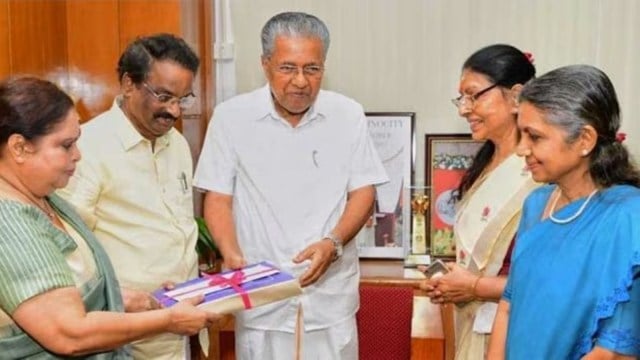‘Highly placed men involved… many icons crumbled’: Hema panel flags sexual harassment in Malayalam film industry
Several of those who deposed before the commission also called for an authority or body to look into the grievances of women in cinema.
 Kerala CM Pinarayi Vijayan receiving the report of the Hema Commission from Retired Justice K Hema. (Photo: Facebook/File)
Kerala CM Pinarayi Vijayan receiving the report of the Hema Commission from Retired Justice K Hema. (Photo: Facebook/File)The Justice Hema Committee report, which looked into the problems faced by women working in the Malayalam film industry, has found that these include sexual harassment, lack of basic facilities like women’s toilets, gender bias and discrimination, disparity in remuneration, and the absence of a legally constituted authority to address their problems.
The report, which has been with the state government for the last four- and-a-half years, was released on Monday after several rounds of legal battles in court as well as at the State Information Commission.
The three-member committee, headed by retired High Court judge Justice K Hema, was formed in July 2017 in the wake of the sexual assault of a prominent actor in a moving vehicle in February that year.
The committee said incidents narrated by witnesses include those involving “highly placed men in cinema”.
“It is very painful to hear some incidents narrated by witnesses in which very highly placed men in cinema were involved. These are the people whom society looks up to with great reverence and admiration. Incident by incident, as narration progressed, many icons started crumbling. These are the people who have the influence and power to change the course of Malayalam movies. Unfortunately, these are the people contributing to the degeneration of the profession.”
The report said the experiences that women have gone through in the industry are shocking, and that many had not even disclosed these to their close family members. The committee said it was not surprised that these experiences were not disclosed earlier given the way the MalayaIm film industry runs and the consequences that women may face for speaking up.
“Surprisingly, in the course of study, we came to know that certain men had also suffered a lot of issues in the industry, and many of them, including some very prominent artistes, were banned, without authorisation, from working in cinema… They would have, knowingly or unknowingly, invited the wrath of one or other person from the powerful lobby in the industry that rules the industry,” the report said.
In reaching its conclusions, the committee relied upon oral statements of witnesses – both men and women – who appeared before it. “We have also taken into consideration various documents, audio clips, video clips, screenshots, WhathApp messages, WhatsApp chats, etc. produced by the witnesses,” the report said.
It also said that one of the reasons why women do not file police complaints over the sexual harassment faced by them in the industry was the fear of faceing online attacks.
A prominent actor told the Commission that a powerful lobby exists that can make anything happen in the industry. This “mafia” can even ban actors, producers and directors, the report said.
This also means that the constitution of an internal complaints committee (ICC) would not be a solution for all the problems faced by women in the Malayalam film industry, according to the report.
The report mentioned the ‘casting couch’, which makes the experience of getting jobs in the film industry different to other fields when it comes to women. Ability and eligibility may not be enough to get a job in the film industry, and the demand for sex is often made with offers for jobs, the report said.
The report also talked of instances where drunk men repeatedly knock or bang on the doors of the hotel rooms of women working in films. This leaves many women with no choice but to take somebody from their family when they go to work as they fear they will not be safe, the report said.
Several of those who deposed before the committee also called for an authority or body to look into the grievances of women in the industry.
The report said that if a woman is perceived as a “problem maker”, she may not get work again in the industry, and that this leads them to keep silent about many of the atrocities they face.
The Justice Hema Committee had submitted its report to the state government in December 2019. However, the Cultural Affairs Department had rejected several RTI applications for the report, saying that making it public would affect the privacy of several witnesses.
In early July this year, the State Information Commission ordered the release of the report without identifying the witnesses. However, a film producer approached court and got an interim stay on the report’s release.
Last week, the Kerala High Court lifted the stay with a directive to the government to hand over the copies of the report within a week. Meanwhile, actor Ranjini had approached the court seeking to be heard before the release of the report, but the plea was rejected on Monday.
After this, the report, which was originally 295-pages long, was released after 63 pages were redacted.
A list of 17 issues faced by women in the Malayalam film industry, according to the Hema Committee report, are given below.
- Sexual demands are made to women from the time they enter the industry
- Sexual harassment, abuse, and assault against women take place at the work place, during transportation, and at places of accommodation
- Women are tortured if they express resentment or unwillingness to fulfil sexual demands
- A lack of basic facilities for women, including toilets and changing rooms at places of work
- Women lack safety at their workplace and accommodation
- Unauthorised and illegal banning of individuals in cinema
- The silencing of women under the threat of banning them from working in the industry
- Male dominance, gender bias and gender discrimination
- The use of drugs and alcohol, disorderly conduct and misbehaviour at place of work, which lead to gross indiscipline
- Being subject to demeaning or vulgar comments at places of work
- The non-execution of contracts between employer and employee to suit individual requirements
- The failure to pay the agreed remuneration
- Disparity of remuneration between men and women, and gender discrimination in remuneration
- Resistance/reluctance to allow women to work on the technical side cinema
- Online harassment
- Lack of legal awareness about their own rights
- The absence of any legally constituted authority to redress their grievances







